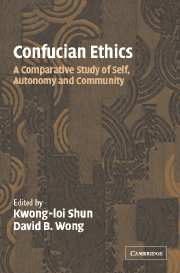Book contents
- Frontmatter
- Contents
- Contributors
- Contributors
- Introduction
- SECTION I RIGHTS AND COMMUNITY
- SECTION II SELF AND SELF-CULTIVATION
- 5 Tradition and Community in the Formation of Character and Self
- 6 A Theory of Confucian Selfhood: Self-Cultivation and Free Will in Confucian Philosophy
- 7 The Virtue of Righteousness in Mencius
- 8 Conception of the Person in Early Confucian Thought
- SECTION III COMMENTS
- Glossary of Chinese Terms
- Index
6 - A Theory of Confucian Selfhood: Self-Cultivation and Free Will in Confucian Philosophy
Published online by Cambridge University Press: 08 December 2009
- Frontmatter
- Contents
- Contributors
- Contributors
- Introduction
- SECTION I RIGHTS AND COMMUNITY
- SECTION II SELF AND SELF-CULTIVATION
- 5 Tradition and Community in the Formation of Character and Self
- 6 A Theory of Confucian Selfhood: Self-Cultivation and Free Will in Confucian Philosophy
- 7 The Virtue of Righteousness in Mencius
- 8 Conception of the Person in Early Confucian Thought
- SECTION III COMMENTS
- Glossary of Chinese Terms
- Index
Summary
Confucius did not spell out the notion of self, inherent in his project of self-cultivation. This project is a self-motivated and self-oriented project of human personal moral development and moral amelioration. It is no doubt most important for the Confucian philosophy of society and state as well, because to Confucius and his followers a good society and a righteous government must start with and hence be founded on the moral perfection of the human person. Hence the question of how to conceive a human self for the purpose of meeting the needs of constructing a good society and a just government remains a core question for the Confucian enterprise. The purpose of this article is to introduce a theory of human self in which self-cultivation and moral self-development of the human person becomes not possible but necessary. In such a theory we are also able to meet the challenge of clarifying what constitutes a free will against the background of the Confucian–Mencian notion of human nature.
We shall start with our empirical observations on the two aspects of the human self, which we shall show correspond to the implicit two dimensions of meaning of the concept of the human self in common Chinese discourse. It is to be shown that this common Chinese notion of human self is embodied in the Confucian statements on cultivation of moral virtues of the human self.
- Type
- Chapter
- Information
- Confucian EthicsA Comparative Study of Self, Autonomy, and Community, pp. 124 - 147Publisher: Cambridge University PressPrint publication year: 2004
- 25
- Cited by



